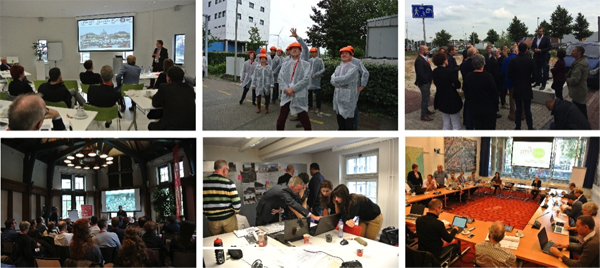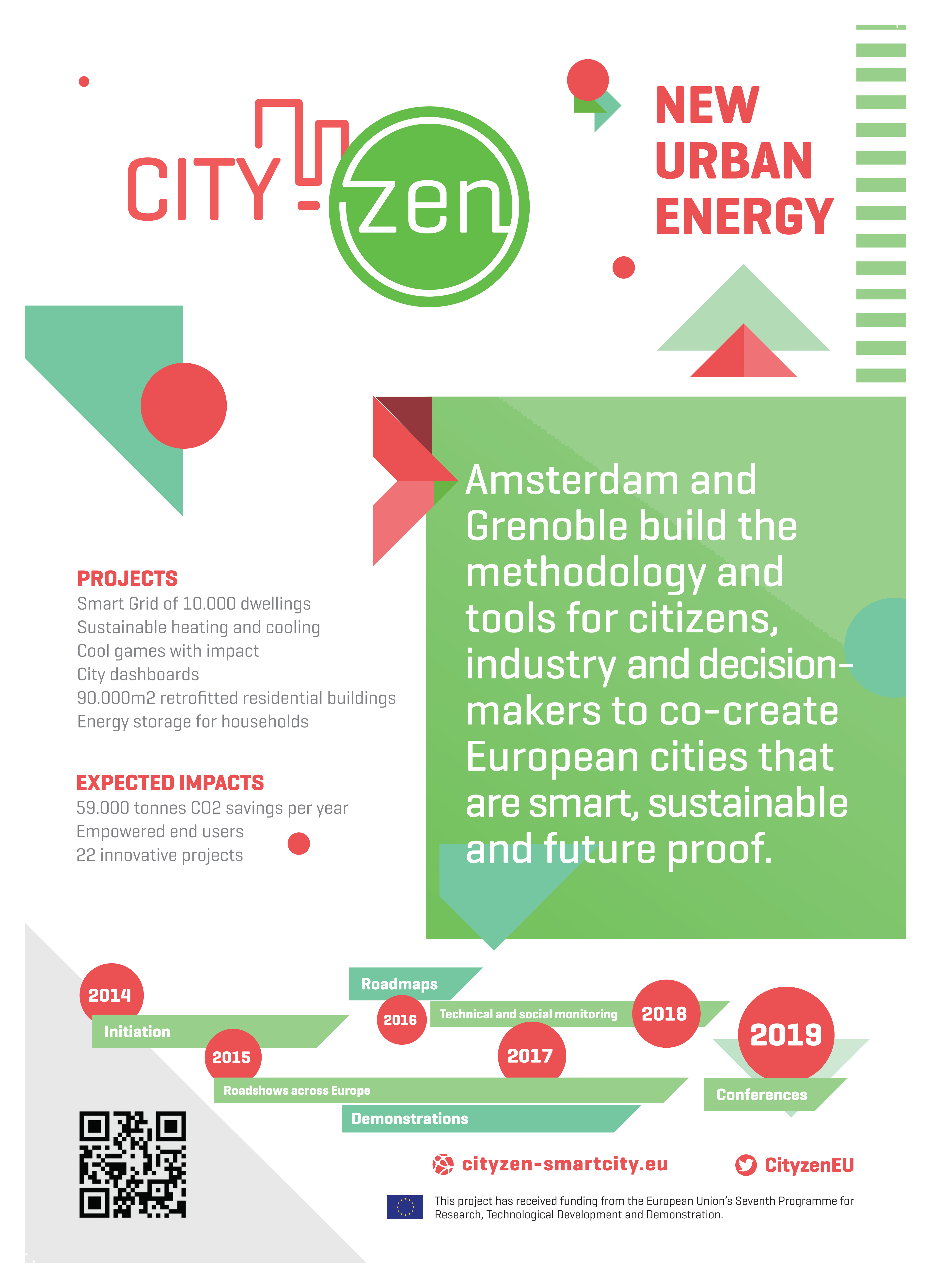THE CITY-ZEN PROJECT
Ecodynamics Group is among the partners of the FP7 EU City-Zen project, engaging 23 partners from five European nations. City-Zen aims to develop and demonstrate Zero Energy Cities with a central role of citizens. In particular, two cities, Amsterdam and Grenoble are used as test-bed for the implementation of innovative energy systems including electricity smart grid, district heating-cooling networks and energy efficient buildings. Complementary activities concern integrated measures and social behaviour conditioning, as well as monitoring systems and big-data management.
EG is involved in methodological development (WP4) and dissemination activities to be held in a number of European cities (WP9).
CITY-ZEN ROADMAP
As part of the WP4 (task T2), Ecodynamics Group is involved in the determination of general guidelines for energy retrofitting of urban districts and city neighbourhoods through integrated energy planning.
EG has developed a Carbon Accounting framework that, as a mediate model, provides clear and explicit information on the current state of carbon emission and inform participative design practices. This has been tested together with project partners of TU Delft (NL), Queen’s University of Belfast (UK), University of Central Lancashire (UK) and Vito (BE) during roadshows and achieved good responses and feedbacks.
The Carbon Accounting framework has been published in the Journal of Cleaner Production – Ref. Pulselli et a. “Carbon accounting framework for decarbonisation of European city neighbourhoods” JCP 2018. In press.
CITY-ZEN ROADSHOWS
As part of WP9 (task T3.4), Ecodynamics Group has contributed within a team of experts in a series of workshops, meant as intense training and co-working sessions to kick-off decarbonisation pathways of the hosting cities. Roadshows have used city-neighbourhoods as living labs that, with direct involvement of local stakeholders (e.g. policy makers, researchers, practitioners, experts and citizens), allowed for demonstrating feasibility of decarbonisation scenarios. Within five working days, the roadshow team of experts from the Unversity of Siena, TU Delft (NL), Queen’s University of Belfast (UK), University of Central Lancashire (UK) and Vito (BE) visit the neighbourhood (on Monday morning), elaborate an integrated energy plan and present results to a wide audience (on Friday morning). Targeted districts are:
1. Colin in Belfast (UK);
2. Bornova in Izmir (TK)
3. Gruz in Dubrovnik (CH) – Ref. van den Dobbelsteen et al. Energies 11 922 2018 – doi:10.3390/en11040922.
4. Slotermeer and Inner City in Amsterdam (NL)
5. Mahon in Menorca (ES)
6. Tiro de Linea in Sevilla (ES) – Ref. Pulselli et al. Sustainable Development and Planning, WIT press, 2018.
7. Roeselare (BE) – Video at: https://www.facebook.com/klimaatswitchvanrsl/videos/634000076948263/?t=264
8. Preston (UK)
9. Nicosia (CY)
10. ……
CARBON ACCOUNTING FRAMEWORK FOR DECARBONISATION OF EUROPEAN CITY NEIGHBORHOODS.
The methodology provided is conceived as a carbon accounting tool to understand the environmental implications of citizen behaviours and address choices for climate action in European city neighbourhoods.
It concerns a series of steps:
– assessment of GHG emissions provided by a single household and at the neighbourhood level by scaling-up.
– ex-ante evaluation of the effects of mitigation strategies concerning different spatial scales, from neighbourhoods to households, until individual citizens, and temporal horizons (short-, medium-, long-term). A detailed equations framework has been provided concerning measures and policies for decarbonisation.
– visualisation of the Carbon Footprint of the neighbourhood in terms of virtual forestland equivalent.
– dynamic representation of the “decarbonisation” plan for city neighbourhoods by crunching the virtual forestland, through the PACMAN visualisation, to raise awareness of citizens and stakeholders.
The combination of the assessment process with the visualisation of outcomes establishes an effective “mediate model” able to inform participative design processes and drive the energy transition of European cities.
The accounting model has been demonstrated by applying to an everage European neighbourhood as reference benchmark for future applications – Ref. Pulselli et al. “Carbon accounting framework for decarbonisation of European city neighbourhoods” JCP 2018. In press.
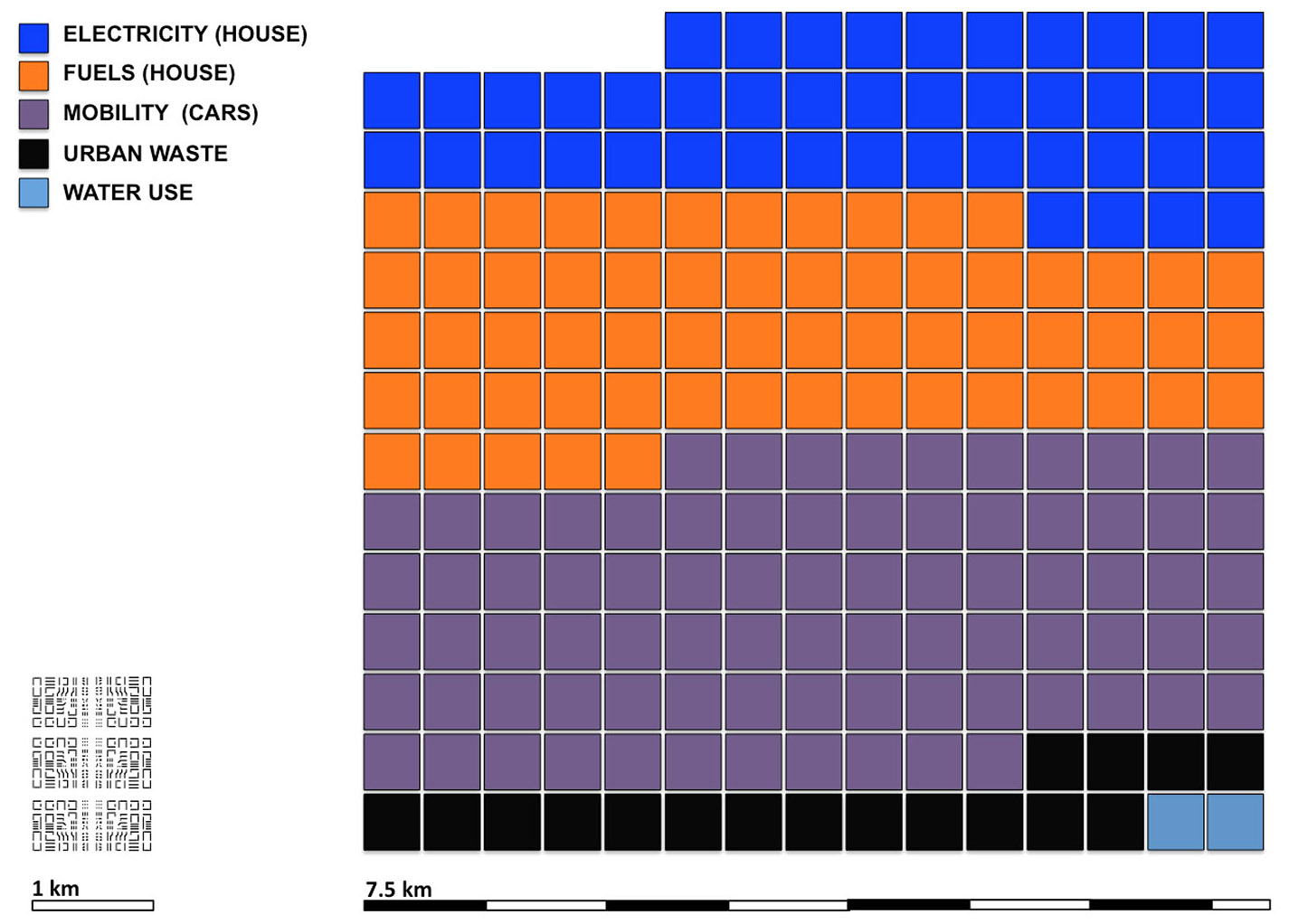
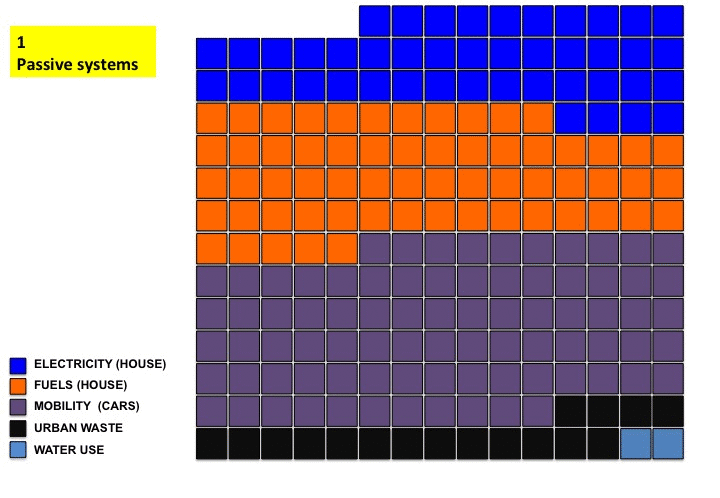
The figure shows the virtual forestland needed to absorb yearly carbon emissions of an average European neighborhood (23,000 inhabitants).
The animated GIF of the Carbon Footprint mitigation scenario based on virtual forestland.
This is an innovative communication issue provided by EG during roadshows.
Project partners at the kick-off meeting in Bruxelles (March the 1st 2014).
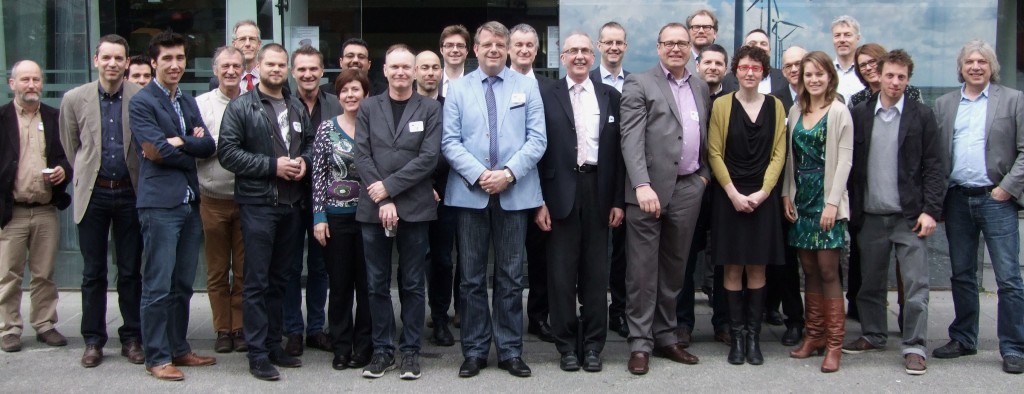
Website: http://www.cityzen-smartcity.eu/home/
Project period: March 2014 – November 2019.
Programme: FP7-ENERGY-SMARTCITIES-2007-2013
Project acronym: City-Zen
Topic: City-zen, a balanced approach to the city of the future
Main output and competences developed by EG: Environmental assessment of innovative technologies for urban district retrofitting towards a zero-energy and low emission state.
THE CITY-ZEN PROJECT
Ecodynamics Group is among the partners of the FP7 EU City-Zen project, engaging 23 partners from five European nations. City-Zen aims to develop and demonstrate Zero Energy Cities with a central role of citizens. In particular, two cities, Amsterdam and Grenoble are used as test-bed for the implementation of innovative energy systems including electricity smart grid, district heating-cooling networks and energy efficient buildings. Complementary activities concern integrated measures and social behaviour conditioning, as well as monitoring systems and big-data management.
EG is involved in methodological development (WP4) and dissemination activities to be held in a number of European cities (WP9).
CITY-ZEN ROADMAP
As part of the WP4 (task T2), Ecodynamics Group is involved in the determination of general guidelines for energy retrofitting of urban districts and city neighbourhoods through integrated energy planning.
EG has developed a Carbon Accounting framework that, as a mediate model, provides clear and explicit information on the current state of carbon emission and inform participative design practices. This has been tested together with project partners of TU Delft (NL), Queen’s University of Belfast (UK), University of Central Lancashire (UK) and Vito (BE) during roadshows and achieved good responses and feedbacks.
The Carbon Accounting framework has been published in the Journal of Cleaner Production – Ref. Pulselli et a. “Carbon accounting framework for decarbonisation of European city neighbourhoods” JCP 2018. In press.
CITY-ZEN ROADSHOWS
As part of WP9 (task T3.4), Ecodynamics Group has contributed within a team of experts in a series of workshops, meant as intense training and co-working sessions to kick-off decarbonisation pathways of the hosting cities. Roadshows have used city-neighbourhoods as living labs that, with direct involvement of local stakeholders (e.g. policy makers, researchers, practitioners, experts and citizens), allowed for demonstrating feasibility of decarbonisation scenarios. Within five working days, the roadshow team of experts from the Unversity of Siena, TU Delft (NL), Queen’s University of Belfast (UK), University of Central Lancashire (UK) and Vito (BE) visit the neighbourhood (on Monday morning), elaborate an integrated energy plan and present results to a wide audience (on Friday morning). Targeted districts are:
1. Colin in Belfast (UK);
2. Bornova in Izmir (TK)
3. Gruz in Dubrovnik (CH) – Ref. van den Dobbelsteen et al. Energies 11 922 2018 – doi:10.3390/en11040922.
4. Slotermeer and Inner City in Amsterdam (NL)
5. Mahon in Menorca (ES)
6. Tiro de Linea in Sevilla (ES) – Ref. Pulselli et al. Sustainable Development and Planning, WIT press, 2018.
7. Roeselare (BE) – Video at: https://www.facebook.com/klimaatswitchvanrsl/videos/634000076948263/?t=264
8. Preston (UK)
9. Nicosia (CY)
10. ……
CARBON ACCOUNTING FRAMEWORK FOR DECARBONISATION OF EUROPEAN CITY NEIGHBORHOODS.
The methodology provided is conceived as a carbon accounting tool to understand the environmental implications of citizen behaviours and address choices for climate action in European city neighbourhoods.
It concerns a series of steps:
– assessment of GHG emissions provided by a single household and at the neighbourhood level by scaling-up.
– ex-ante evaluation of the effects of mitigation strategies concerning different spatial scales, from neighbourhoods to households, until individual citizens, and temporal horizons (short-, medium-, long-term). A detailed equations framework has been provided concerning measures and policies for decarbonisation.
– visualisation of the Carbon Footprint of the neighbourhood in terms of virtual forestland equivalent.
– dynamic representation of the “decarbonisation” plan for city neighbourhoods by crunching the virtual forestland, through the PACMAN visualisation, to raise awareness of citizens and stakeholders.
The combination of the assessment process with the visualisation of outcomes establishes an effective “mediate model” able to inform participative design processes and drive the energy transition of European cities.
The accounting model has been demonstrated by applying to an everage European neighbourhood as reference benchmark for future applications – Ref. Pulselli et al. “Carbon accounting framework for decarbonisation of European city neighbourhoods” JCP 2018. In press.


The figure shows the virtual forestland needed to absorb yearly carbon emissions of an average European neighborhood (23,000 inhabitants).
The animated GIF of the Carbon Footprint mitigation scenario based on virtual forestland.
This is an innovative communication issue provided by EG during roadshows.
Project partners at the kick-off meeting in Bruxelles (March the 1st 2014).

Website: http://www.cityzen-smartcity.eu/home/
Project period: March 2014 – November 2019.
Programme: FP7-ENERGY-SMARTCITIES-2007-2013
Project acronym: City-Zen
Topic: City-zen, a balanced approach to the city of the future
Main output and competences developed by EG: Environmental assessment of innovative technologies for urban district retrofitting towards a zero-energy and low emission state.


